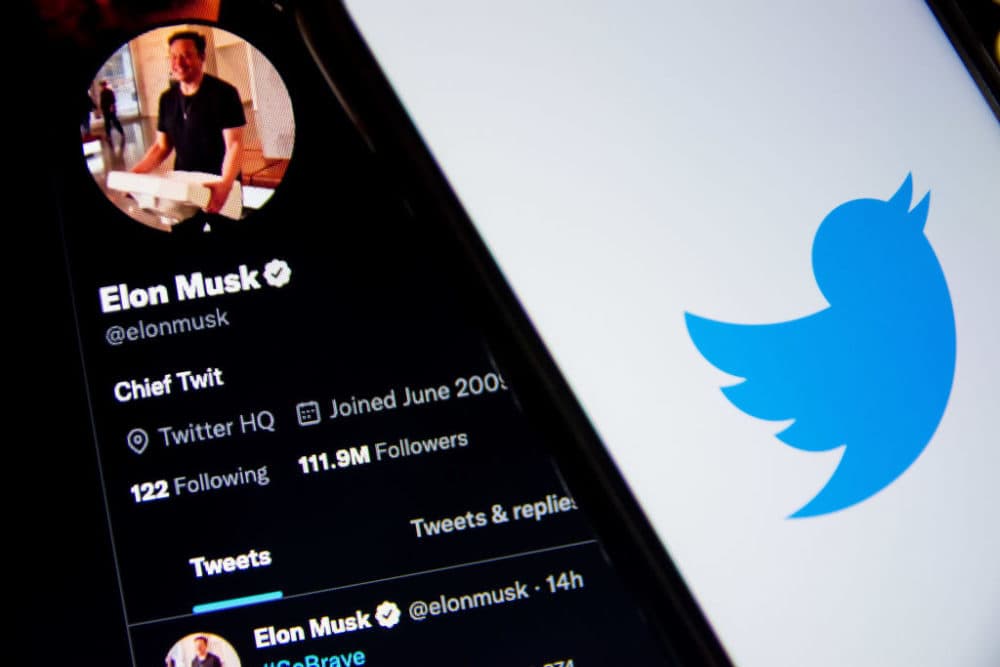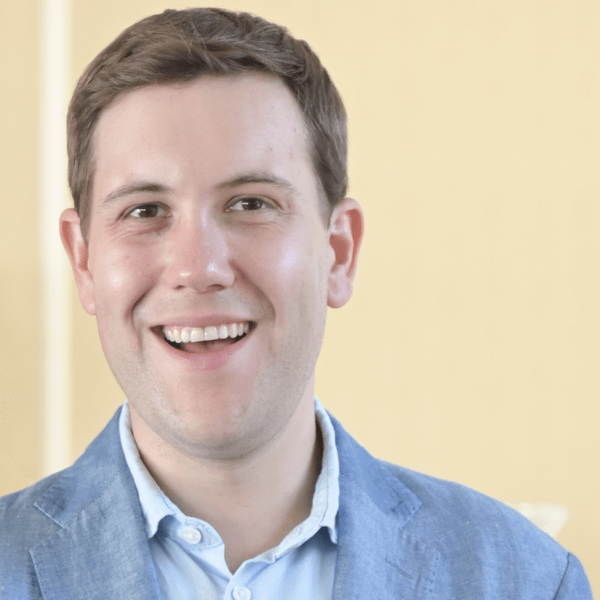Advertisement
What Elon Musk's Twitter takeover means for the social media platform

Sign up for the On Point newsletter here.
Elon Musk paid $44 billion for Twitter. And got more than he bargained for.
"The marketers are Twitter's customers. Tesla has historically never done any marketing," Nilay Patel says. "He has no idea how advertising works."
Disappointed fans:
"There's just a variety of figures who are saying, We were promised free speech. And now you're talking to the Anti-Defamation League, and why would you do that?" Patel adds.
And an unenviable choice between anonymity and transparency.
Today, On Point: What Elon Musk’s ownership of Twitter means for one of the most powerful social media platforms.
Guests
Nilay Patel, editor-in-chief of the tech news site The Verge. (@reckless)
Sen. Ed Markey, U.S. senator for Massachusetts. Chair of the Subcommittee on Clean Air, Climate and Nuclear Safety; and the Subcommittee on East Asia, the Pacific and International Cybersecurity Policy. (@SenMarkey)
Transcript: Sen. Ed Markey On Elon Musk's Twitter Takeover
ANTHONY BROOKS: Today, we're looking at the saga of Elon Musk's takeover of Twitter. ... One of the more surreal twists in this story played out last Friday. A verified account appeared on Twitter, which claimed to belong to Massachusetts U.S. Senator Ed Markey. But the account wasn't Markey's, it was a hoax.
In fact, it was one of a string of hoax accounts that have proliferated ever since Elon Musk introduced an account verification system that let people buy a coveted blue checkmark for $8 a month. It turns out that the fake Markey account was created by Geoffrey Fowler, a journalist at the Washington Post, with the blessing of Senator Markey himself. In other words, it was a sting to show how weak Musk's new verification system was.
On Friday, the real Senator Markey broke cover and tweeted to Musk, demanding that Twitter must explain how this happened. Musk tweeted back at the senator. Perhaps, he suggested, it is because your real account sounds like a parody. Markey wasn't amused. He still isn't, I think it's safe to say. And he's with me live from Washington right now. Senator Ed Markey, Democrat of Massachusetts. Great to have you. Thanks for joining us today.
Advertisement
SEN. ED MARKEY: No, it's great to be with you, Anthony. Thank you.
BROOKS: Yeah, we really appreciate it. Listen, you demanded that Twitter must explain how this happened. Has Musk done that? Have you heard back from him?
MARKEY: No, we have not heard back. I wrote him a letter asking him to give me the answers by Thanksgiving. And that's asking ... One, what is the verification process that they are using at Twitter, to make sure that somebody who says they're someone is actually that person? How did the fake accounts proliferate almost overnight? How did that happen? What were the safeguards? And is Twitter considering actually bringing the program back, without having built in real safeguards? In order to protect against the absolute catastrophe that occurred at the end of last week.
BROOKS: And talk a little bit more about that absolute catastrophe, and really put a fine point on it. What is your greatest concern about this verification system that wasn't?
MARKEY: Well, we stand at a moment in history when democracy is in jeopardy and disinformation runs rampant, and one of the fiercest sites of this battle for truth and democracy is on social media. And so it is absolutely critical when a company, Twitter, which holds itself out as the global town square, puts down its safeguards, its guardrails.
And is in a position to ensure that the platform isn't breeding, manipulation, deceit, fraud online? Undermining — and this is the key — trust. Trust that what people are hearing ... is actually coming from the person whom Twitter is saying is actually speaking.
BROOKS: Senator, you said that you'd like a response explaining the process by November 25th. If you don't hear from him by November 25th, what actions will you take? What action can you take?
MARKEY: Well, we'll cross that bridge when we get to it. But obviously at this point, the Federal Trade Commission has had Twitter on privacy probation for years. And Elon Musk knew that when he purchased a Twitter. So he has a responsibility to make sure that safeguards are in place. And so the federal government has been essentially overseeing Twitter for years. And so I want to hear back from him. What is he going to do in order to make sure that they meet the standards which the Federal Trade Commission has imposed upon them.
In order to ensure that there is not deceptive, discriminatory actions, unfair and deceptive practices which are taking place through Twitter with a representation by Twitter. That because that site has been purchased for $8, that they have a check mark, a blue check that says that this is authentic. So my hope is that he will get back quickly before he relaunches, in order to make it very clear to me and to the public what, in fact, those safeguards are going to be.
BROOKS: You tweeted that to Elon Musk, one of your companies is under a Federal Trade Commission consent decree. We talked about that earlier in the hour, referring to Twitter. You went on to say auto safety watchdog NHTSA is investigating another — referring to Tesla there — for killing people. And you're spending your time picking fights online. Fix your companies or Congress will.
Senator, I should have mentioned this before. You sit on the communication media and broadband subcommittee and you're a frequent critic of big tech. But when you say fix your companies or Congress will, what more can Congress do to force Elon Musk? What are you referring to there, specifically?
MARKEY: Well, I also serve on the committee with jurisdiction over the Department of Transportation. And NHTSA, which has jurisdiction over Tesla and Elon Musk's autonomous vehicles. And they're being investigated right now by the Department of Transportation for practices which lead to unsafe conditions on the roads in our country with these driverless vehicles that could endanger the passengers or endanger people in other vehicles, or who are pedestrians.
So I think it's absolutely critical that Congress actually pass laws which establish strong standards to ensure that these autonomous vehicles, these Tesla autonomous vehicles, have to meet the highest safety standards. But I also believe that with regard to Twitter, which, you know, owns. That, we also have to ensure that we pass laws that ensure that big tech, including Tesla, act with transparency, that the algorithms that are used are done so with justice and are done in a way that doesn't allow for discriminatory practices to be engaged in.
And if the Twitter check gives you an opportunity to enter the global town square, almost as now an uncontrolled entity or individual, I think that very, very bad things will be occurring online. So transparency is key, and I think we have to pass legislation towards that goal. And that's why I would hope that voluntarily Mr. Musk would put those transparency standards in place for Twitter with the safeguards, with the guardrails that are there and strong.
BROOKS: Senator, I know your time is short, but if I could convince you to stay another minute or so, I want to bring Nilay Patel back into this conversation because he knows so much about this issue, a lot more than me. Nilay, I'm just wondering if you've got a question for the senator.
NILAY PATEL: Here's what I've been wondering. You do have oversight over these companies. There is a First Amendment issue, particularly around moderation standards. The government cannot impose moderation standards on Twitter. Where do you think the line is? What is the line of things you can do, and where is the line of things you cannot do?
MARKEY: Well ... it's great to talk to you again. I think that it's very clear that if Twitter has someone pay $8 in order to be able to represent themselves to be a United States senator, or Eli Lilly or the CDC. And then a fraudster is able to use that as a way into the global town square. Then Twitter has to be held accountable for that. We don't have to decide between free speech, and online trust. And where Twitter is participating in a process that allows for a representation that someone is not who they really are. And that could be, again, the first Twitter blue check went to CDC so that people could go to that site with reliability, with regard to their own health.
And if that's undermined, then I think Twitter has to be held accountable. So I think to a very large extent, that's a false choice. And big tech knows it. And they know where their responsibilities are. And if Elon Musk thinks it's just a Wild West and anything goes, it just runs contrary to the core principles that we need in our country in order to protect people against manipulation that is, in fact, facilitated by big tech. So I just don't agree with Senator Cruz. But that's pretty much my position, you know, on those issues.
BROOKS: Senator, a final thought before I let you go. Do you have any faith that Twitter can be brought back from the brink and play a productive role in the sort of social media world that would continue to benefit society?
MARKEY: Well, again, there's a Dickensian quality to these technologies. It's the best of liars and the worst of liars, simultaneously. It can enable. It can ennoble. It can degrade. It can debase. We want the good parts of this social media world. But where companies act irresponsibly, where companies allow for a degradation of our society and are being paid in order to help an individual or a group to degrade our society, then that's a line that we do not want to cross.
We have to have no more profits that are placed over people. We need to ensure that we have a code of conduct for computer code. We need algorithmic justice. We need safeguards. We need guardrails, especially when the company profits from taking down those guardrails. That's just inconsistent with what our country has historically stood for.
And to the extent to which there are companies that think that anything goes, and our society is just a Wild West playground for their profiteering, then that has to end. And that's my hope. My hope is that we'll reach a point here where where Elon Musk comes to understand that and that he acts in a way which is responsible. That's why I sent him the letter with my hopes that his answer would reflect now is understanding of his great responsibility.
Related Reading
The Verge: "Welcome to hell, Elon" — "Twitter is a disaster clown car company that is successful despite itself, and there is no possible way to grow users and revenue without making a series of enormous compromises that will ultimately destroy your reputation and possibly cause grievous damage to your other companies."
This program aired on November 16, 2022.

